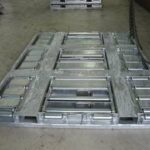
Why Hydraulic System Failures Happen – and How to Prevent Them
Hydraulic systems are the beating heart of much of the equipment found on the tarmac. Whether it’s lifting, steering, braking, or towing — hydraulics make it happen. But when something goes wrong, the consequences can be immediate and costly. From ground delays to unexpected downtime, hydraulic failure is something no operator can afford. So what causes these issues, and more importantly, how can you prevent them?
At Hydeng GSE, we’ve been servicing and rebuilding hydraulic systems for over 40 years. Here’s what we’ve learnt about the most common points of failure — and how to stay ahead of them.
1. Contaminated Fluid
The #1 enemy of any hydraulic system? Dirty oil. Contaminated fluid can damage internal components, cause valves to stick, and reduce overall efficiency. Dirt, water, and metal particles can enter the system through worn seals, poor maintenance practices, or even during fluid replacement.
How to prevent it:
Use high-quality hydraulic fluid and change it at manufacturer-recommended intervals.
Regularly inspect and replace filters.
Keep the system sealed and clean during maintenance.
2. Worn or Damaged Seals
Hydraulic seals do a tough job — they keep fluid where it needs to be and pressure consistent. Over time, seals degrade due to heat, friction, or simply age. Once a seal fails, it often leads to leaks, pressure loss, or contamination.
How to prevent it:
Include seal inspections in your routine servicing.
Replace seals at the first sign of wear — don’t wait for them to fail.
Ensure correct seal installation and alignment to avoid premature damage.
3. Overheating
Hydraulic systems generate heat through fluid friction and pressure. If the system runs too hot for too long, it can lead to fluid breakdown, seal damage, and premature component failure. In hot climates or heavy-use applications, overheating is a common culprit.
How to prevent it:
Monitor fluid temperatures during operation.
Make sure your system has adequate cooling.
Check fluid levels regularly — low oil can cause excessive heat.
4. Poor System Design or Modifications
Sometimes the issue starts with how the system was designed or modified. Mismatched components, undersized hoses, or awkward routing can create weak points or pressure imbalances that lead to failure over time.
How to prevent it:
Consult experienced hydraulic technicians when making changes or upgrades.
Use properly rated components and fittings.
Stick with manufacturers who understand the demands of GSE environments — like Hydeng.
Stay Ahead with Preventative Maintenance
The best way to avoid failure? Preventative maintenance. At Hydeng GSE, we offer regular servicing and diagnostics for hydraulic systems used across a wide range of Ground Support Equipment. From hose replacements and fluid checks to full overhauls, we keep your fleet running smoothly and safely.
When it comes to hydraulics, a little attention now saves a lot of trouble later. Get in touch with us today to schedule a service or talk about upgrades — we’re here to keep your operation moving.
Ready to Elevate Your Ground Operations?
Discover the Hydeng GSE difference. With over 40 years of expertise in custom design, precision manufacturing, and reliable maintenance solutions, we are your trusted partner in Ground Support Equipment.
Whether you need custom-built equipment, regular maintenance, or compliance inspections, our team is here to help. Reach out to us today and find out how we can optimise your ground support fleet for maximum performance and safety.




